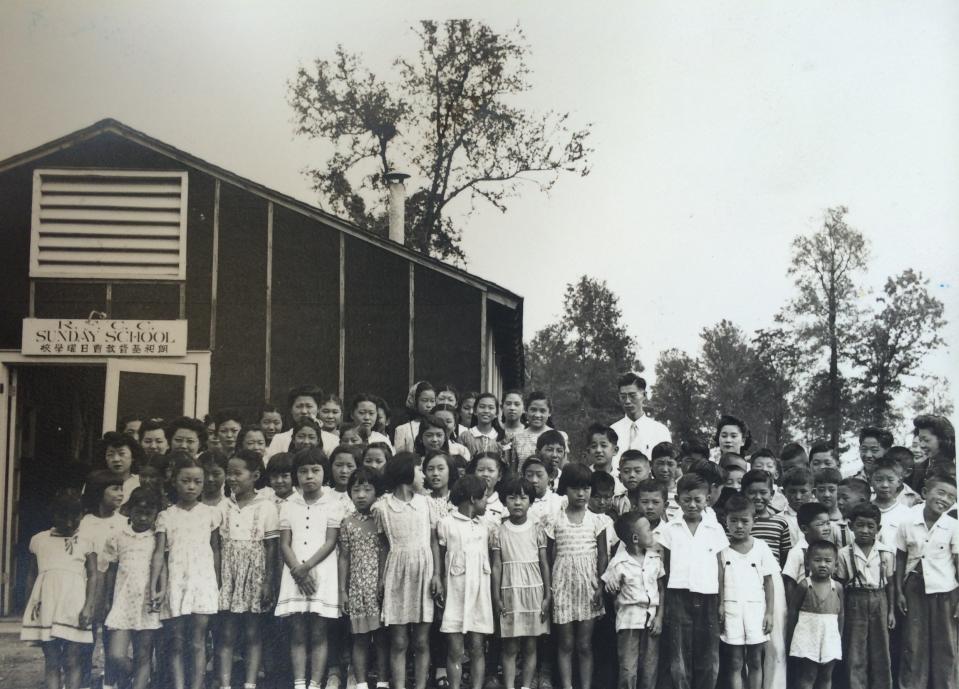The Perpetual Foreigners
Last Monday, in a flash of red mesh and twinkling crystals, U.S. figure skater Mirai Nagasu landed a historic triple axel, becoming the first American woman to do so at the Olympics. Her U.S. teammates, including her roommate Adam Rippon, leapt to their feet clapping with joy.
What should have been an uncontroversially proud moment for all Americans—with the exception, perhaps, of Fox’s resident diversity-skeptic John Moody—devolved into a Twitter cause célèbre over race in America.
In the midst of the online jubilation, Bari Weiss, a New York Times op-ed writer and editor, tweeted out, “Immigrants: They get the job done,” along with a video of Nagasu. As has been reported ad nauseam, Nagasu was born in California. Her parents are immigrants from Japan, but they were not depicted in the tweet.
Twitter lit up. The Washington Post’s Ishaan Tharoor asked if Weiss labeled American-born Nagasu as an immigrant because she’s not white, to which Weiss took offense. She said that she knew that Nagasu was born in California, but thought “poetic license was kosher.”
Weiss deleted the first tweet citing a deluge of online abusers telling her she was “a racist, a ghoul and that I deserve to die.” But she didn’t give an inch, retweeting a series of articles that identified Nagasu’s parents—not Nagasu—as immigrants. She seemed genuinely confused about the substantive difference. “Do you need another sign of civilization’s end,” she asked. “The line is a Hamilton reference. I know she was born in Cali. Her parents are immigrants. I was celebrating her and them.”
Many commenters chose to explain why they weren’t crazy about the conflation. In three bubbly tweets, New Yorker contributor Karen Chee broke down the concept of the perpetual foreigner—the assumption that Asian-Americans are always seen as immigrants, regardless of generation—while acknowledging that Weiss’s intention was “kind and noble.” In response to Weiss’s report of abusive treatment, Chrissy Teigen offered a similarly gentle take: “It’s called perpetual otherism or perpetual foreigner syndrome. No one is ashamed of the word immigrant but it’s tiring being treated as foreigners all the time. You made a mistake. It’s okay.”
Weiss thanked Chee, but instead of offering a “my bad” and moving on, she stuck to the view that her critics had “been monitoring her account waiting to pounce.” For her recalcitrant stance, sites like Jezebel mocked her, and Frank Rich tweeted “beware of any writer who cites criticism as ‘a sign of civilization’s end.’” It was a perplexing doubling down. If the online abuse was so bad, why follow up with the exact same sentiment? Was it because Weiss’s elevation of her worst critics also made her into something of a martyr?
Soon an influential tribe of anti-identity-politics intellectuals jumped into the mix. Christina Hoff Sommers, who calls herself the Factual Feminist, took to ridiculing some of Weiss’s more prominent commenters, but none, notably, who were actually abusive. The neuroscientist and author Sam Harris gleefully retweeted her. Bret Weinstein—a former biology professor who was horribly ousted from Evergreen College over bogus accusations of racism—also weighed in, claiming that Weiss’s critics “wait for the slightest misstep” just to “savage” her and this was about “power, and witches.” It was as if Teigen, a 32-year-old swimsuit model with a penchant for junk-food tweets, had been hiding out in an intersectional foxhole, stockpiling torches, instead of merely reacting to an old stereotype she knew well when it popped up in her timeline.
In a Forward article entitled “Leave Bari Weiss Alone,” Cathy Young argued: “I would much rather deal with the occasional well-meaning but insensitive remark than have people walk on eggshells.” With the debates about free speech roiling college campuses, I can understand the impulse. But this seems like a false dilemma. Are discussions about language and ethnicity completely off limits lest we devolve into Stalinism? This seems to be another form of shutting down discourse. The message from many Weiss supporters was clear: Just shut up.
So here we are. On one side were those aggrieved by generations of flippant attitudes branding them as foreigners, and on the other, those suffering PTSD from other identity-politics warfare. Neither side seemed to take an opposing position to immigration itself, but seemed to delight in reducing the other side to its worst actors, all the same.

I don’t think Weiss is a racist and some of her treatment on Twitter was grossly and disproportionately vicious. But it did seem like she and her defenders were dismissive of what many respectful commenters were trying to communicate about playing sloppy with facts. Some cited that Weiss herself is the daughter of immigrants. A number specifically pointed to their Eastern-European Jewish immigrant heritage, claiming that they refer to second-generation Americans as immigrants. My father’s grandparents are also Russian-Jewish immigrants and I’ve never heard complaints from that side similar to those of the Japanese-American relatives on my mother’s side. Perhaps this is where Weiss’s confusion lies. In Japanese-American diaspora, we don’t collapse generations and have specific designations: Issei (the immigrant generation), Nisei, Sansei, and so forth. Still, it’s a bit of sophistry to swap the two. Take my father’s more famous Newark high-school classmate Philip Roth whose parents are from Galicia. It’s hard to imagine someone tweeting “Immigrants: They get the job done” if he won a book award today.
Perpetual foreigner syndrome has a particular history in the Japanese-American community. On February 19th, 1942, after the bombing of Pearl Harbor, Franklin D. Roosevelt authorized the mass incarceration of 120,000 American citizens and legal residents of Japanese ancestry without due process. My California-born grandparents, Hiroshi and Grayce Uyehara, were among them, forcibly removed and put in horse stalls behind barbed wire. Half a billion dollars in private property was confiscated. The estimated net-income loss was between $1.8 billion and $2.7 billion. It would go down as one of the worst civil-rights violations in U.S. history. I suppose you could say that Roosevelt took poetic license for his own, less honorable, aims.
In the 1980s, my grandmother, then executive legislative director of the Japanese American Citizens League (JACL), led the Redress lobbying effort. In 1987, when the New York Times published an article with the headline “House Votes to Pay Japanese War Internees,” she wrote a letter to the editor pointing out the incorrect designation of Japanese-Americans as simply Japanese. That New York Times editor also, of course, meant no harm. In today’s conservative parlance, my grandmother might be accused of policing words or not keeping the focus on the real bigots. But she was a busy woman who wasted no time on frivolous pursuits. What she understood was that precise words matter because they reflect societal attitudes, which can materialize in very real ways, regardless of one person’s intention. Today it plays out in discrimination in employment and higher education. And narrowly criticizing a prominent journalist’s incorrect usage is not “speech policing”—particularly without calls for government oversight or loss of livelihood—it is freedom of speech.
To get more insights on this period, I called up Grant Ujifusa, who worked alongside my grandmother as the JACL Redress Strategy Chair to secure the Civil Liberties Act of 1988. Perhaps the critics were right—that this was merely millennial political correctness gone amok. If anyone alive today could delineate between worthwhile discourse and hysteric outrage, I thought it might be this 76-year-old civil rights activist, who doesn’t ascribe to identity politics, and has no Twitter account.
Ujifusa was sympathetic to Weiss’s attempt to make the case for immigrants. But he was firm. “You cannot use a factually incorrect statement to advance a worthy political cause.”
“She has a Japanese first and last name. This was the problem we faced,” he said, referring to Nagasu. “It’s the problem of the perpetual foreigner.” In just the 1980s, Ujifusa remembers fellow Americans calling into radio shows to complain about the politicians giving $20,000 to “the people who bombed Pearl Harbor.” Similarly, some of Weiss’s Twitter defenders also conflated the two. “Isn’t Japan really xenophobic towards foreigners,” one asked me when I tweeted about this history. Another claimed that my grandparents “didn’t deserve” their Constitutional rights.
“It was on this point that we were sent to camp,” Ujifusa said. “Foreigners always and perpetually just off the boat, just like the skater. That’s why we make a big deal about it—[whether the incorrect designation is as a] desirable or undesirable immigrant.”

Weiss’s supporters, like Shadi Hamid at The Atlantic, have caricatured this simple distinction as an “infatuation with being offended” in the “identitarian age,” distracting from more pressing issues. Hamid is confused, among other things, about the basis of the complaint, hijacking, and distorting it for his own personal crusade against excesses of modern identity politics. (That The Atlantic and other outlets devoted editorial resources to old-hat clickbait on a supposed outrage that had died down four days prior while high-school students are changing the gun-control conversation is its own kind of irony.) Many Japanese-Americans have been calmly and respectfully fighting the perception of perpetual foreigner for more than a century now, long predating the recent rise of multiculturalism and modern identity politics. And let’s not forget that the internment itself was based on a particularly pernicious strain of identity politics, as well as the idea that there were more pressing issues at stake—a war—than a simple truthful distinction. It’s bizarre to witness journalists in the age of Trump ferociously arguing that a factual untruth shouldn’t be corrected. But the anti-identity-politics mob has their own form of senseless virtue signaling.
The idea of perpetual foreigner often takes well-intentioned forms. In high school, a football player teasingly told me to “go tend your rice paddies.” I told him clearly and succinctly what I thought of his joke. He blushed and apologized. That was that; I have warm feelings about him today. But I shudder to think of the argument we might have had if his head was filled with the rhetoric of online forums today, denigrating all protestations of racial stereotyping as hysteria, with a particularly cruel type of mocking dismissiveness. Weiss’s supporters do her no favors by stretching fair critiques into a grand ideological struggle, instead of suggesting, as so many have and done themselves, “to admit a mistake” and move on.
"Today, there are many outdated phrases most of us are happy to have left behind and this newfound sensitivity is not weakness, but a strength. We are a better America today precisely because of it."
If Weiss’s supporters would like to hang their arguments on civility, ending online abuse, and freedom of speech, I, as most would, agree with them wholeheartedly and unreservedly. But most have gone several steps further by prescribing how others should or should not perceive a long-standing stereotype or behave in their own daily lives—a sort of “thought policing” in its own right. Ideas of polite speech are ever-evolving. Today, there are many outdated phrases most of us are happy to have left behind and this newfound sensitivity is not weakness, but a strength. We are a better America today precisely because of it.
The request to lose the perpetual foreigner label is based on the premise of treating all Americans equally, and it isn’t a huge ask. Neither is a little empathy on the matter. But the online trolls and unscrupulous journalists that branded Weiss a racist for her attempt to celebrate this country’s immigrant history did little in getting there. This empathy standoff between identity-politics naysayers and the perpetual-foreigner weary is a lose-lose game. My grandparents dedicated their lives to work for the right of all Americans to be treated with dignity—and that even applies to people we don’t agree with on Twitter. Empathy is a courtesy, not a Constitutional right. If we want to gain some from folks like Weiss, then we have to extend it ourselves.


